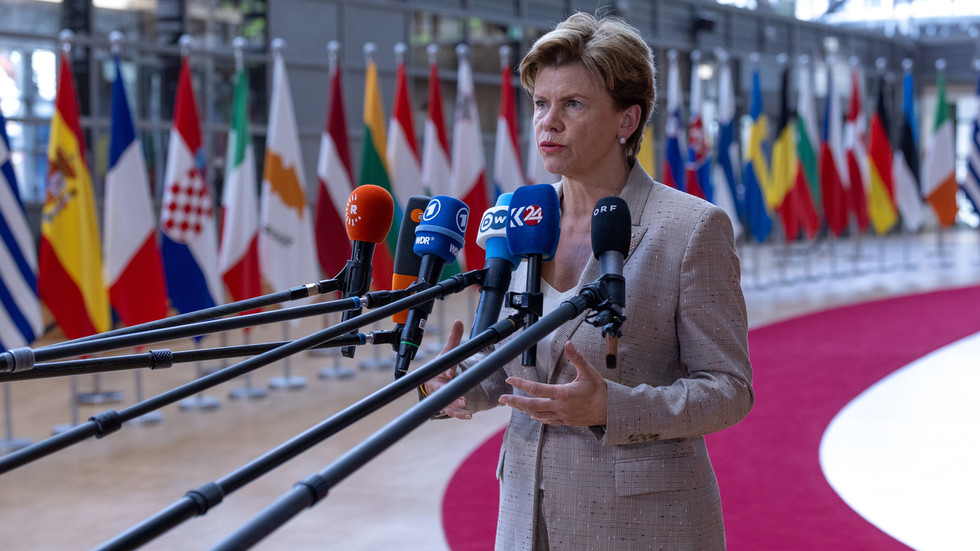Trump acknowledged discussing with some Republicans the option of firing Powell but denied a letter had been drafted to do that.
Published On 16 Jul 2025
United States President Donald Trump has denied plans to fire US Federal Reserve Chair Jerome Powell, after media reports that the president is likely to do so soon triggered a drop in stocks and the dollar, and a rise in Treasury yields.
Such reports are not true, Trump said on Wednesday.
“I don’t rule out anything, but I think it’s highly unlikely unless he has to leave for fraud,” Trump said, a reference to recent White House and Republican lawmaker criticism of cost overruns in the $2.5bn renovation of the Fed’s historic headquarters in Washington, DC.
Stocks pared losses and Treasury yields pared declines after Trump’s comments, which also included a now-familiar barrage of criticism against the Fed chair for not cutting interest rates, calling him a “terrible” chair.
Trump did talk with some Republican lawmakers about firing Powell, he said, but said he is more conservative about his approach to the question than they are.
Trump floated the idea and showed a draft of a letter firing Powell in a meeting with around a dozen Republican lawmakers on Tuesday night, according to The New York Times and Bloomberg News, citing unnamed sources, as the president polled them if he should and indicated that he likely would. The president has acknowledged the poll, but has denied that there was such a letter.
In response to a question about whether the White House has given any indication that the president intends to try to fire Powell, a Fed official pointed to Powell’s public statements that he intends to serve out his term.
As Trump downplayed the possibility of firing Powell, though, Republican Senator Thom Tillis used his time on the floor of the Senate to deliver a spirited defence of an independent Fed, which economists say is the linchpin of US financial and price stability.
“There’s been some talk about potentially firing the Fed chair,” said Tillis, a member of the Senate Banking Committee that oversees the Fed and confirms presidential nominations to its board. Subjecting the Fed to direct presidential control would be a “huge mistake,” he said.
“The consequences of firing a Fed chair, just because political people don’t agree with that economic decision, will be to undermine the credibility of the United States going forward, and I would argue if it happens, you are going to see a pretty immediate response, and we’ve got to avoid that,” Tillis said.
Adding pressure
Powell, who was nominated by Trump in late 2017 to lead the Fed and then nominated for a second term by Democratic President Joe Biden four years later, is serving a term that goes through May 15, 2026.
Trump has been attacking Powell on a near-daily basis for not cutting interest rates. Powell has said the interest rate decisions will be driven by data and the Fed is in a wait-and-watch mode as it see how Trump’s several tariff policies impact the economy.
Bharat Ramamurti, senior adviser for economic strategy at the American Economic Liberties Project and former deputy director of the National Economic Council, in emailed comments, said that it is better for the US economy to have an independent bank that sets interest rates apart from politics.
“What’s going on under the surface here is that Donald Trump has a political problem. He came to office promising to lower costs for people, and what’s happened is that his own economic agenda has made it basically impossible for the Fed to lower interest rates.”
Last week, the White House intensified its criticism of how the Fed is being run when the director of the Office of Management and Budget, Russell Vought, sent Powell a letter saying Trump was “extremely troubled” by cost overruns in the $2.5bn renovation of its historic headquarters in Washington.
Powell responded by asking the US central bank’s inspector general to review the project, and the central bank posted a “frequently asked questions” factsheet, which rebutted some of Vought’s assertions about VIP dining rooms and elevators that he said added to the costs.
Source:
Al Jazeera and news agencies

 14 hours ago
1
14 hours ago
1










 English (US) ·
English (US) ·